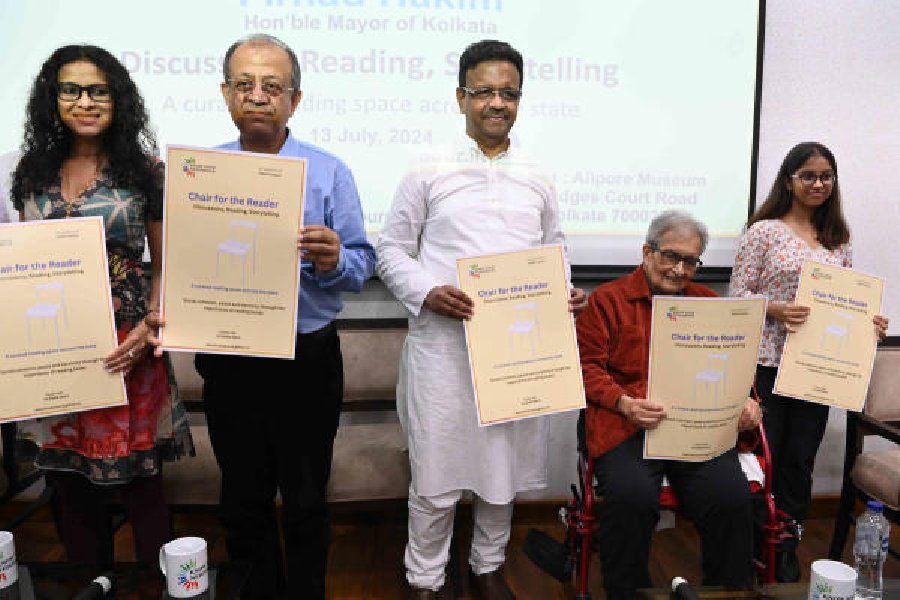Dara Shikoh, son of Mughal emperor Shah Jahan and Mumtaz, was the first translator of the Upanishads, from Sanskrit to Persian. He did it with the help of Hindu priests.
Such collaboration between Hindus and Muslims, which goes beyond merely tolerating one another, is imperative to resist the attempt to turn India into a majoritarian, one-religion country, Nobel laureate Amartya Sen said in Calcutta on Saturday.
He was speaking at the ceremonial launch of the Chair for the Reader, an initiative by the Know Your Neighbour campaign, which promotes social cohesion, harmony and encourages dialogues among different communities and faith groups.
The latest initiative seeks to create a “curated reading space, where regular book talks and exchange of ideas will address gaps, silences, neglected and misconstrued issues”.
Sen hailed the initiative and put it in context by stressing the shared pluralistic history of this land.
“The introduction of European scholars to Hindu scriptures, in particular the Upanishads, was to a great extent based on the Persian translation of the Upanishads done by Dara Shikoh. He was not a great Sanskrit scholar himself but he did work hard with the help of Hindu pundits and priests to translate the Upanishads into Persian. Scholars like Max Muller translated the Upanishads from the Persion version,” Sen, who was awarded Bharat Ratna in 1999, said.
“There is a concerted effort to turn India into a one-religion country. This effort needs to be resisted. It is in this context that I must talk of Kshitimohan Sen (Amartya’s maternal grandfather who taught in Santiniketan). He wrote a book called Hindu Muslamaner Yukta Sadhana. He says that tolerance is often overvalued. There is nothing spectacular in tolerating one another,” Sen said.
“Children in school, who have not received wrong education (ku-shiksha), do not harbour such discrimination. As they grow up, these things start creeping in. What is most important is yukta sadhana, the working together of Hindus and Muslims. It can be religious but can also be political, socio-economic, education or the health system.... Many people do not know how strong these collaborations are. Take Ali Akbar Khan on one side and Ravi Shankar on the other. The same spirit is there in literature. We should take pride in that.
“I had asked my students in Delhi, ‘Can you think of the first translator of Hindu scriptures? A world famous monument is named after the mother of the translator’. No one could give the correct answer. The monument is Taj Mahal,” Sen said before talking about Dara Shikoh.
The organisers of the programme, Know Your Neighbour, have set up a reading space at Mominpore.
“In order to sensitise young minds through literary discussions, we have rented a place in Mominpore, known as KYN Adda, where these
book talks and discussions will be held regularly. The space is already operational. Since March this year, we
have had a few sessions,” said Sabir Ahamed, convener of the Know Your Neighbour campaign.
“Our programme will provide a scope to the youths of Mominpore and the larger Kidderpore area that lack reading spaces and bookshops. The space, however, welcomes anyone keen to take part in such discussions. The aim is quite ambitious, for we dream of opening such spaces across the state,” said Ahamed.
Kidderpore and adjoining Garden Reach and Metiabruz are often labelled
“mini Pakistan” by the Right-wing ecosystem that goes to great lengths to project — without evidence — these places as the hub of “anti-national activities”.
“Traditional libraries are in bad shape. To save this country, we need to cling on to the interactive multiculturalism and pluralism that is inherent in Indian culture. We will have a curated reading list aligned to these themes,” Ahamed added.
On Saturday, the Chair for the Reader was launched by Sen at Alipore Museum. Firhad Hakim, the mayor of Calcutta, and Jayanta Sengupta, the director of the museum, were among those present.
A book talk preceded the launch. It was centred around Talashnama, written by Ismail Darbesh and translated by V. Ramaswamy. The book explores the uncertainties and challenges of being a Muslim in today’s India.
The discussion focussed on the literary representation of the Muslim identity. Besides the author and the translator, the panel also included Nilanjana Gupta, retired professor of English at Jadavpur University, and Md Ozayer Siddiki, Peerzada, Furfura Sharif.











